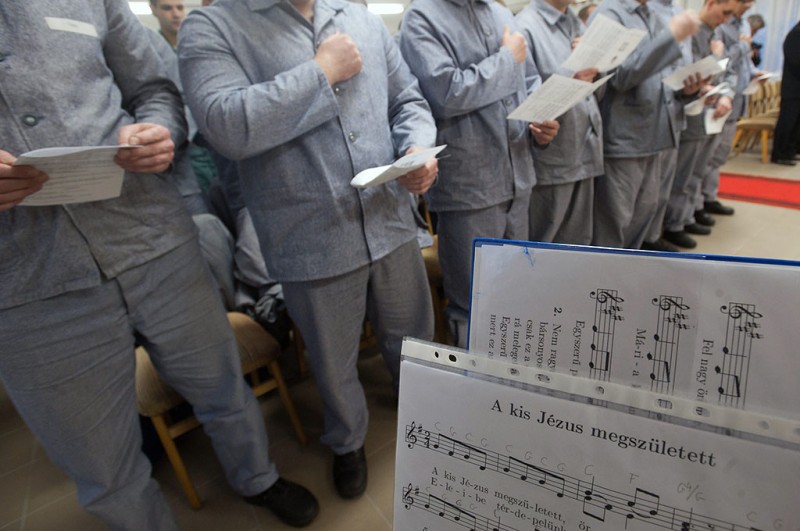The https://english.atlatszo.hu use cookies to track and profile customers such as action tags and pixel tracking on our website to assist our marketing. On our website we use technical, analytical, marketing and preference cookies. These are necessary for our site to work properly and to give us inforamation about how our site is used. See Cookies Policy
Tighter visitation rules in prisons did not lower the amount of contraband
New rules by Hungarian prison authorities are making life harder for prisoners and their families: with no touching allowed, wifes cannot kiss their husbands and children cannot hug their fathers. Authorities claim that the new rules were introduced to fight contraband, but data acquired by Atlatszo proves that a year after the rules were introduced more contraband is getting into prisons than before.
At the beginning of last year the national command for prisons (Büntetés-végrehajtás Országos Parancsnoksága, BVOP) made the rules for prison visits much tougher than before. Visitors and prisoners cannot touch each other and tables between them have panels installed that further separate them. Prisoners have to pay more to make calls, which further complicates staying in touch with family members.

BVOP argues that the stricter rules are needed because too much contraband gets into prisons, including cell phones, drugs, knives and prescription drugs. However, it was very hard for visitors to take contraband into prisons even before the rules were made stricter as all visitors have been required to go through a metal detector. Prisoner’s clothes are searched before and after the visits and there are CCTV cameras in the visitation rooms as well.
Atlatszo covered the negative effects of the changes at the end of last year: these strict rules are making it harder to keep family ties strong, which will make it harder for prisoners to re-integrate into society after their release.
Atlatszo wanted to know if the changes in the rules had any effect on how much contraband got into prisons. At the time of reporting our previous story, we filed a freedom of information request with BVOP, asking them how many cell phones and other objects they confiscated from prisoners. We wanted to compare similar time periods, so we asked for data from the first six months of 2016 and 2017.
We received the data, and it turned out that after rules were made tighter there were more objects confiscated:
January 1-June 30, 2016: 584 cell phones and 136 substances suspected to be illegal drugs were confiscated
January 1-June 30, 2017: 847 cell phones and 154 substances suspected to be illegal drugs were confiscated
Since the end of last year, BVOP published its own statistics covering the entire year as well. According to their report, 1459 cell phones were confiscated in 2016. In 2017 this number was higher: 1680.
This is interesting because the argument behind making visitation rules stricter was that BVOP needs to fight prisoners’ access to contraband, but numbers show that even though prisoners and their families cannot touch each other anymore there are more cell phones and drugs smuggled into prisons than before.
At the end of last year, BVOP also said that most of the contraband gets into the prisons in packages sent to prisoners. All packages are checked with metal detectors and they are also opened up by prison guards before they are delivered.
How is it possible that there are more cell phones smuggled into prisons since the rules for visitation were tightened and packages are checked by two methods? How are prison guards missing what is happening?
Atlatszo wanted to know if prison guards were checked more strictly as well: we asked how many times prison guards were under criminal or disciplinary proceedings for allegedly helping to get contraband into prisons. BVOP answered our questions this March: in the first six months of 2016 there were five cases of prison guards being accused of helping contraband get into prisons. In 2017, there were 12 cases.
The hardest punishments were reprehension and reprimand – that is, the guards were allowed to keep their jobs.
Written by Katalin Erdélyi
English version by Anita Kőműves, editing by Clare Humphreys.
You can read the original, Hungarian-language story here.
[sharedcontent slug=”hirdetes-english”]
Share:
Your support matters. Your donation helps us to uncover the truth.
- PayPal
- Bank transfer
- Patreon
- Benevity
Support our work with a PayPal donation to the Átlátszónet Foundation! Thank you.
Support our work by bank transfer to the account of the Átlátszónet Foundation. Please add in the comments: “Donation”
Beneficiary: Átlátszónet Alapítvány, bank name and address: Raiffeisen Bank, H-1054 Budapest, Akadémia utca 6.
EUR: IBAN HU36 1201 1265 0142 5189 0040 0002
USD: IBAN HU36 1201 1265 0142 5189 0050 0009
HUF: IBAN HU78 1201 1265 0142 5189 0030 0005
SWIFT: UBRTHUHB
Be a follower on Patreon
Support us on Benevity!

